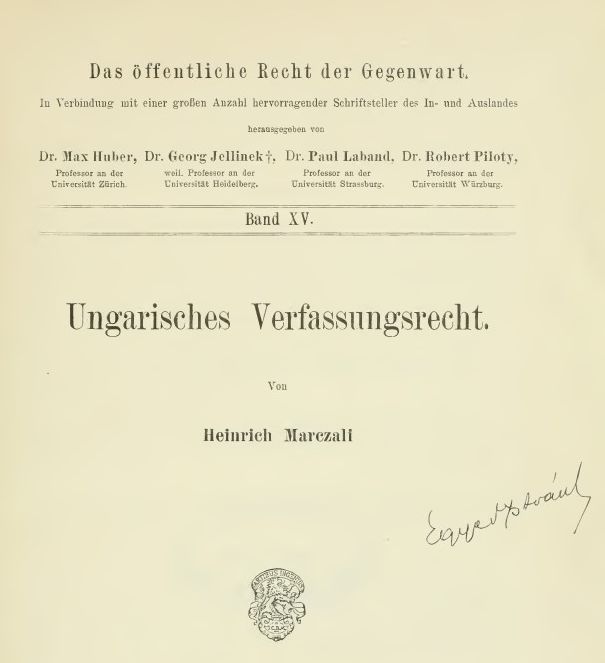Professzionális történész a dilettáns szerepében
Marczali Henrik 1912-es alkotmánytörténeti vitája
DOI:
https://doi.org/10.15170/PAAA.2024.11.02.12.Kulcsszavak:
historiográfia, eszmetörténet, nacionalizmus, alkotmány, Marczali HenrikAbsztrakt
A tanulmány elsődleges célja egy elfeledett alkotmánytörténeti vita rekonstruálása és értékelése. Marczali Henrik német nyelven 1910-ben magyar alkotmánytörténeti, 1911-ben pedig alkotmányjogi szintézist készített, ráadásul egy rangos könyvsorozat keretén belül. Marczali megbízatása kiváltotta a hazai közjogászok (Polner Ödön, Ferdinándy Gejza, Eöttevényi-Nagy Olivér, Schiller Bódog, Csekey István) haragját, akik nem nézték jó szemmel, hogy egy történész ír közjogi kérdésekről, mégpedig külföldi közönség számára. 1912-ben először publicisztikában, majd folyóiratokban támadták Marczali felfogását, különösen azokat a gondolatait, amelyeket a Szent Korona-tanról közölt. Marczali radikálisan új értelmezését adta a dualizmus idején elterjedt, nacionalista és történetietlen koronatannak – a szerző tragédiája azonban, hogy ezt nem történeti műben tette, így a közjogászok könnyen lesöpörhették érvelését, mondván, nem illetékes az alkotmányjog területén. Tanulmányom a vita rekonstruálásán, a felek érvelésének bemutatásán kívül arra is választ keres, hogy miért vált elfeledetté ez az összecsapás később, és milyen tanulságok vonhatók le mindebből a professzionalizációs diskurzusokra nézve? Fő állításom ezzel kapcsolatban az, hogy a szakmák beszédmódja és besorolásai (szakember-dilettáns) egyaránt járhatnak pozitív és negatív következményekkel: egyrészt távol tarthatják a szakmától a valóban dilettáns és káros nézeteket, ám olykor innovatív gondolatokat megfogalmazó kívülállókat is peremre szoríthatnak.
Letöltések
Hivatkozások
Bernatzik, Edmund: Neues über die pragmatische Sanction. Österreichische Zeitschrift für öffentliches Recht 2. (1915–1916) 125–204.
Bernatzik, Edmund: Eine Entgegnung. Österreichische Zeitschrift für öffentliches Recht 2. (1915–1916) 653–656.
Csorba László: A vallásalap „jogi természete”. Az egyházi vagyon problémája a polgári átalakulás korának Magyarországán 1782–1918. Budapest, 1999.
Csekey István: A magyar trónöröklési jog. Jogtörténelmi és közjogi tanulmány oklevélmellékletekkel. Budapest, 1917.
Csekey István: A magyar alkotmány és a külföld. Budapesti Szemle 220. (1931):638. 73–91.
Dénes Iván Zoltán: A történelmi Magyarország eszménye. Szekfű Gyula, a történetíró és ideológus. Pozsony, 2015.
Dénes Iván Zoltán: Választott nemzet. Marczali Henrik élete és munkássága. Budapest, 2022.
Eöttevényi-Nagy Olivér: Magyar közjog. Marczali németül írt magyar közjoga. Magyar Társadalomtudományi Szemle 5.(1912):4. 310–322.
Erős Vilmos: Modern historiográfia. Az újkori történetírás egy története. Budapest, 2015.
Ferdinándy Gejza: Marczali és a magyar közjog. Budapesti Szemle 150. (1912):424–426. 71–98.
Folyóiratok szemléje. Akadémiai Értesítő(1912):265–276. 483–487.
Grothe, Ewald: Zwischen Geschichte und Recht. Deutsche Verfassungsgeschichtsschreibung 1900–1970. München, 2005. ǁ [DOI] https://doi.org/10.1524/9783486595291
Halász Imre: A Szent Korona tana. Nyugat 5. (1912):6. 681–689.
Hellebrant Árpád: A magyar történeti irodalom 1912-ben. Melléklet a „Századok” 1913. évi folyamához. Budapest, 1913.
Hóman Bálint – Szekfű Gyula: Magyar történet, I. kötet. Budapest, 1935.
Marczali Heinrich: Ungarische Verfassungsgeschich te. Tübingen, 1910.
Marczali Heinrich: Ungarisches Verfassungsrecht. Tübingen, 1911.
Marczali Henrik: A Pragmatica Sanctio új megvilágításban. Budapesti Szemle 164. (1915):466–468. 190–200.
Marczali, Heinrich: Übersicht der Geschichte Ungarns. In: Ungarn. Land und Volk, Geschichte, Staatsrechts, Verwaltung und Rechtspflege, Landwirtschaft, Industrie und Handel, Schulwesen, Wissenschaftliches Leben, Literatur, Bildende Künste. Budapest, 1918. 116–213.
Marczali Henrik: Emlékeim. Budapest, 2000. [Eredeti megjelenés: 1929]
Polner Ödön: Magyar közjog német nyelven, 1–2. rész. Jogállam 11. (1912):1. 337–362.; Jogállam 11. (1912):6. 417–443.
Polner Ödön: Das Staatsrecht des Königreiches Ungarn und seiner Mitländer. In: Ungarn. Land und Volk, Geschichte, Staatsrechts, Verwaltung und Rechtspflege, Landwirtschaft, Industrie und Handel, Schulwesen, Wissenschaftliches Leben, Literatur, Bildende Künste. Budapest, 1918. 214–267.
Romsics Ignác: Clio bűvöletében. Magyar történetírás a 19–20. században, nemzetközi kitekintéssel. Budapest, 2011.
Törő László Dávid:„A szellemtörténet is csak az adatokból indulhat ki”. Eckhart Ferenc történészi munkásságának főbb problémái. Budapest, 2020.
Turbucz Péter: Az utolsó felvonástól a „Hogyan készült a nagy háború?” megjelenéséig. Marczali Henrik I. világháború értelmezéseinek útja. In: Levéltári Évkönyv Új Folyam IV. Szerk. Kis József. Miskolc, 2022. 236–263.

Downloads
Megjelent
Hogyan kell idézni
Folyóirat szám
Rovat
License
Copyright (c) 2025 László Dávid Törő

This work is licensed under a Creative Commons Attribution-NonCommercial-NoDerivatives 4.0 International License.










